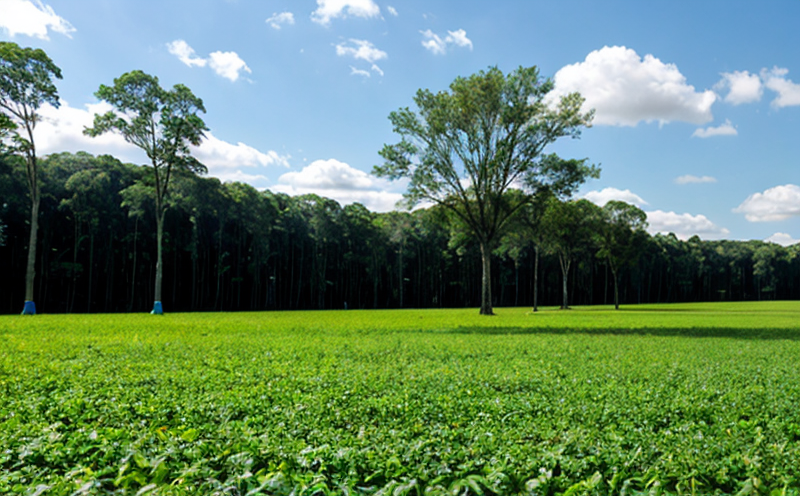Sustainable Sourcing Verification Testing
As global demand for consumer products continues to rise, ensuring that these products are both safe and responsibly sourced has become a critical concern. Sustainable sourcing verification testing plays an essential role in this process by validating the environmental and social impact of raw materials used in product manufacturing. This service involves rigorous testing methods designed to assess the sustainability credentials of suppliers and materials, thereby helping businesses meet their commitments to ethical sourcing and reducing ecological footprints.
The process begins with a thorough review of supplier documentation, which includes certifications like FSC (Forest Stewardship Council), Rainforest Alliance, or LEED. Once documented evidence is verified, physical testing commences using advanced analytical techniques such as chromatography for trace metals detection in materials derived from natural resources, spectroscopy for identifying adulteration risks, and gas chromatography-mass spectrometry (GC-MS) to analyze volatile organic compounds (VOCs).
For textiles, fiber content analysis is conducted through near-infrared (NIR) technology. This ensures that the declared composition matches actual composition without any falsifications. In the case of electronics, heavy metal content testing is performed using inductively coupled plasma mass spectrometry (ICP-MS), while plastic additives like phthalates are detected via liquid chromatography-tandem mass spectrometry (LC-MS/MS).
Environmental impact assessment includes lifecycle analysis (LCA) which quantifies the environmental effects of a product throughout its life cycle from raw material extraction to disposal. This helps identify areas where improvements can be made, ensuring compliance with international standards such as ISO 14040 and ISO 14044.
Compliance with regulatory frameworks like REACH (Registration, Evaluation, Authorisation and Restriction of Chemicals) in Europe or TSCA (Toxic Substances Control Act) in the United States is also a key aspect. These regulations mandate stringent controls on hazardous substances used in manufacturing processes to protect human health and the environment.
Through these comprehensive tests, we not only verify that materials meet sustainability criteria but also ensure they comply with all relevant legal requirements. By leveraging cutting-edge technology and robust methodologies, our sustainable sourcing verification testing service provides reliable data that supports informed decision-making throughout supply chains.
Why It Matters
Implementing sustainable sourcing practices is not only a moral responsibility but also a strategic business move. Consumers are increasingly demanding transparency regarding the origins of products they purchase, especially those involved in industries like fashion, electronics, and home goods where sustainability has become a significant factor influencing purchasing decisions.
Reduces reputational risks associated with unethical or environmentally damaging practices.
Enhances brand reputation among eco-conscious consumers who value corporate social responsibility (CSR).
Facilitates compliance with increasingly stringent environmental regulations worldwide.
Promotes innovation and development of more sustainable products, which can lead to cost savings over time due to reduced resource consumption.
In addition to these benefits for businesses themselves, sustainable sourcing also contributes positively to society by supporting fair labor practices within supply chains and promoting biodiversity conservation efforts where raw materials are sourced. It fosters long-term partnerships with suppliers who share similar values around sustainability.
Industry Applications
| Industry | Sustainable Sourcing Focus Areas |
|---|---|
| Fashion & Apparel | Textile traceability, carbon footprint reduction, sustainable fiber sourcing. |
| Electronics | Conflict minerals avoidance, e-waste management practices assessment. |
| Paper & Packaging | Woodland conservation efforts evaluation, paper recycling rates measurement. |
| Furniture Manufacturing | Veneer and wood product authenticity verification, sustainable timber sourcing audits. |
In the fashion industry, sustainable sourcing focuses on ensuring that fabrics used in clothing production come from sources committed to reducing their carbon footprint. This includes using organic cotton or recycled polyester which have lower environmental impacts compared to conventional alternatives.
For electronics manufacturers, conflict minerals such as tantalum, tin, tungsten, and gold are of particular concern because they may originate from mines funding armed conflicts in regions like eastern Congo. Ensuring these materials are ethically sourced is crucial for maintaining good standing with consumers concerned about human rights issues.
Paper companies must consider how their sourcing practices affect forests worldwide by evaluating whether suppliers follow best practices for sustainable forestry management, such as avoiding deforestation and promoting reforestation initiatives.
In furniture manufacturing, verifying the authenticity of veneers and wood products helps prevent illegal logging while supporting responsible forest stewardship. Additionally, assessing sustainability in this sector involves examining how materials are sourced and processed to minimize waste generation during production processes.
Quality and Reliability Assurance
Our sustainable sourcing verification testing service adheres strictly to recognized international standards such as ISO 14001 for environmental management systems, ISO 9001 for quality management systems, and ASTM D7854-16 which specifies procedures for determining the wood species of veneers used in furniture manufacturing.
The reliability of our testing results is ensured through stringent quality control measures that include proficiency testing programs accredited by recognized bodies like A2LA (Accreditation Laboratory). Regular calibration of instruments and adherence to manufacturer guidelines further guarantee accurate measurements. All reports generated from this service undergo rigorous review before being delivered to clients, ensuring they contain only verified information.
In summary, our sustainable sourcing verification testing service offers a comprehensive approach that combines cutting-edge technology with robust quality assurance practices. This ensures that businesses receive reliable data on the sustainability credentials of their suppliers and materials, enabling them to make informed decisions that align with both ethical standards and regulatory requirements.





